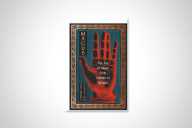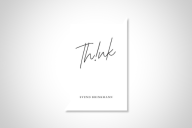You have /5 articles left.
Sign up for a free account or log in.
What I remember about that morning was that the black cloud was already overhead when I woke up. It followed me around. My wife wondered what all the sighing was about.
"Today I ruin this guy’s life," I told her. "His department told me he has office hours around noon. He’s going to pick up the phone, and when he does, I’m going to have to ask him questions that will be humiliating. It's going to ruin his life.”
“You shouldn’t look at it that way,” she said. “He did it to himself.”
True enough. I had a dossier of material showing that the professor in question had engaged in plagiarism -- quite a lot of it, actually, and in the very book that had gotten him tenure.
One author he plagiarized from had assembled a document in what seems to be the classic format for such cases. The lefthand column contained paragraphs of her work. The one on the right was from his book, published several years later, copied more or less word for word, with the occasional minuscule tweak of phrase or punctuation -- but without so much as a faint gesture of acknowledgment in the text, the footnotes, or the bibliography.
As I found through some digging, she was not the only author he had expropriated. (It is a safe generalization that plagiarists are always serial offenders.) With the other aggrieved parties, he had come to some kind of quiet agreement -- while the university he worked for remained none the wiser. That was about to change.
I would give him a chance to explain himself, of course. But really there was not much he could say. Plagiarism is one offense where simply presenting the evidence often amounts to conviction.
To be honest, researching the story had involved a certain amount of aggressive glee on my part. There is a special pleasure that comes from establishing an airtight case. (Besides, the superego is a bit of a sadist.) But now, with the prospect of actually talking to the guy looming, it was surprising to feel contempt give way to pity. His luck had run out. In a couple of days, he would be notorious. It felt as if I were serving as his judge, jury, and executioner – not to mention the court stenographer. Oddly enough, I felt guilty.
Besides, the psychology of the serial plagiarist is so puzzling as to be a fairly absorbing mystery. So I’d discovered a few years earlier from Norman Fruman’s book Coleridge, the Damaged Archangel (Brazillier, 1971).
The poet had not simply borrowed a thought or image here and there. Some of the occasional borrowings in his verse might be discounted as, well, poetic license. After all this time, the fact that Coleridge extracted large parts of his theory of imagination from the work of German philosophers seems more interesting than it is shocking. (The notion of intertextuality can be used to excuse a variety of sins.)
But when you learn that most of Coleridge’s prose writings were also copied from other writers -- often from Grub Street hacks of his day -- then it seems that something very odd is going on. And the more you love his poetry, the harder it is to know what to think of his kleptomania. Should you be indignant? Or just perplexed?
As for the 21st century professor .... he was no tortured Romantic genius. He did sound mortified when I called, and deeply regretful. He also managed to blame his graduate student assistant, who, he asserted, was somehow the one really at fault. (Just as the two-column format is the standard way of documenting plagiarism, so, it seems, the grad-student assistant is the standard scapegoat, at least with light-fingered academics.)
That half-hearted acceptance of responsibility on his part did the trick. My ambivalence vanished. A week or so later, the university announced that he had resigned from his position. I felt neither pride nor guilt -- only the mild curiosity appropriate to something that's now really none of your business.
But the topic of plagiarism itself keeps returning. One professor after another gets caught in the act. The journalists and popular writers are just as prolific with other people's words. And as for the topic of student plagiarism, forget it -- who has time to keep up?
It was not that surprising, last fall, to come across the call for papers for a new scholarly journal called Plagiary: Cross-Disciplinary Studies in Plagiarism, Fabrication, and Falsification. I made a mental note to check its Web site again -- and see that it began publishing this month.
One study is already available at the site: an analysis of how the federal Office of Research Integrity handled 19 cases of plagiarism involving research supported by the U.S. Public Health Service. Another paper, scheduled for publication shortly, will review media coverage of the Google Library Project. Several other articles are now working their way through peer review, according to the journal’s founder, John P. Lesko, an assistant professor of English at Saginaw Valley State University, and will be published throughout the year in open-source form. There will also be an annual print edition of Plagiary. The entire project has the support of the Scholarly Publishing Office of the University of Michigan.
In a telephone interview, Lesko told me that research into plagiarism is central to his own scholarship. His dissertation, titled “The Dynamics of Derivative Writing,” was accepted by the University of Edinburgh in 2000 -- extracts from which appear at his Web site Famous Plagiarists, which he says now gets between 5,000 and 6,000 visitors per month.
While the journal Plagiary has a link to Famous Plagiarists, and vice versa, Lesko insists that they are separate entities -- the former scholarly and professional, the latter his personal project. And that distinction is a good thing, too. Famous Plagiarists tends to hit a note of stridency such that, when Lesko quotes Camille Paglia denouncing the poststructuralists as “cunning hypocrites whose tortured syntax and encrustations of jargon concealed the moral culpability of their and their parents' generations in Nazi France,” she seems almost calm and even-tempered by contrast.
“It seems that both Foucault and Barthes' contempt for the Author was expressed in some rather plagiaristic utterances,” he writes, “a parroting of the Nietschean ‘God is dead’ assertion.” That might strike some people as confusing allusion with theft. But Lesko is vehement about how the theorists have served as enablers for the plagiarists, as well as the receivers of hot cargo.
“After all,” he writes, “a plagiarist -- so often with the help of collaborators and sympathizers -- steals the very livelihood of a text’s real author, thus relegating that author to obscurity for as long as the plagiarist’s name usurps a text, rather than the author being recognized as the text's originator. Plagiarism of an author condemns that author to death as a text’s rightfully acknowledged creator...” (The claim that Barthes and Foucault were involved in diminishing the reputation of Nietzsche has not, I believe, ever been made before.)
To a degree, his frustration is understandable. In some quarters, it is common to recite – as though it were an established truth, rather than an extrapolation from one of Foucault’s essays – the idea that plagiarism is a “historically constructed” category of fairly recent vintage: something that came into being around the 18th century, when a capitalistically organized publishing industry found it necessary to foster the concept of literary property.
A very interesting argument to be sure -- though not one that holds up under much scrutiny.
The term “plagiarism” in its current sense is about two thousand years old. It was coined by the Roman poet Martial, who complained that a rival was biting his dope rhymes. (I translate freely.) Until he applied the word in that context, plagiarius had meant someone who kidnapped slaves. Clearly some notion of literary property was already implicit in Martial’s figure of speech, which dates to the first century A.D.
At around the same time, Jewish scholars were putting together the text of that gigantic colloquium known as the Talmud, which contains a passage exhorting readers to be scrupulous about attributing their sources. (And in keeping with that principle, let me acknowledge pilfering from the erudition of Stuart P. Green, a professor of law at Louisiana State University at Baton Rouge, whose fascinating paper "Plagiarism, Norms, and the Limits of Theft Law: Some Observations on the Use of Criminal Sanctions in Enforcing Intellectual Property Rights" appeared in the Hastings Law Review in 2002.)
In other words, notions of plagiarism and of authorial integrity are very much older than, say, the Romantic cult of the absolute originality of the creative genius. (You know -- that idea Coleridge ripped off from Kant.)
At the same time, scholarship on plagiarism should probably consist of something more than making strong cases against perpetrators of intellectual thievery. That has its place, of course. But how do you understand it when artists and writers make plagiarism a deliberate and unambiguous policy? I’m thinking of Kathy Acker’s novels, for example. Or the essayist and movie maker Guy Debord’s proclamation in the 1960s: “Plagiarism is necessary. Progress demands it.” (Which he, in turn, had copied from the avant-garde writer Lautreamont, who had died almost a century earlier.)
Why, given the potential for humiliation, do plagiarists run the risk? Are people doing it more, now? Or is it, rather, now just a matter of more people getting caught?
Given Lesko’s evident passion on the topic of plagiarism as a moral transgression – embodied most strikingly, perhaps, in his color-coded War on Plagiarism Threat Level Analysis – I had to wonder if the doors of Plagiary would be open to scholars not sharing his perspective.
Was it worth the while of, say, a Foucauldian to offer him a paper?
“It may be that I’m a bit more conservative than some scholars,” he conceded. But he points out that manuscripts submitted to Plagiary undergo a double-blind review process. They are examined by three reviewers – most of them, but not all, from the journal’s editorial board.
There is no ideological or theoretical litmus test, and he’s actively seeking contributions from people you might not expect. “I’m willing to consider articles from plagiarists,” he said.
That’s certainly throwing the door wide open. You would probably want to vet their work pretty carefully, though.








